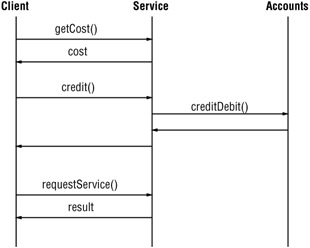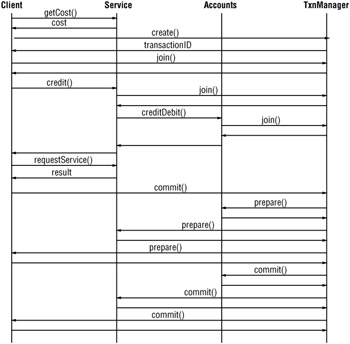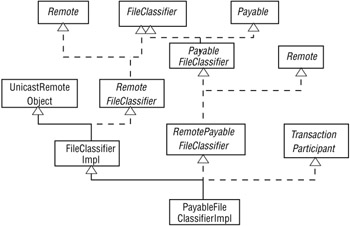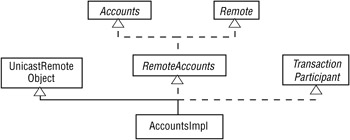180.
|
A Transaction ExampleThe classic use of transactions is to handle money transfers between accounts. In this scenario there are two accounts, one of which is debited and the other credited. This is not a very exciting example, so we shall try a more complex situation. Suppose a service decides to charge for its use. If a client decides this cost is reasonable, it will first credit the service and then request that the service be performed. The actual accounts will be managed by an Accounts service, which will need to be informed of the credits and debits that occur. A simple Accounts model is one in which the service gets some sort of customer ID from the client, and passes its own ID and the customer ID to the Accounts service, which manages both accounts. This is simple, it is prone to all sorts of e-commerce issues that we will not go into, and it is similar to the way credit cards work! Figure 16-1 shows the messages in a normal sequence diagram. The client makes a getCost() call to the service and receives the cost in return. It then makes a credit() call on the service, which makes a creditDebit() call on the Accounts service before returning. The client then makes a final requestService() call on the service and gets back a result.  Figure 16-1: Sequence diagram for credit/debit example There are a number of problems with the sequence of steps that can benefit by using a transaction model. The steps of credit() and creditDebit() should certainly be performed either both together or not at all. But in addition there is the issue of the quality of the service ”suppose the client is not happy with the results from the service and would like to reclaim its money, or better yet, not spend it in the first case! If we include the delivery of the service in the transaction, then there is the opportunity for the client to abort the transaction before it is committed. Figure 16-2 shows the larger set of messages in the sequence diagram for normal execution. As before, the client requests the cost from the service, and after getting this, it asks the transaction manager to create a transaction and receives back the transaction ID. It then joins the transaction itself. When it asks the service to credit an amount, the service also joins the transaction. The service then asks the account to creditDebit() the amount, and as part of this, the account also joins the transaction. The client then requests the service and gets the result. If all is fine, it then asks the transaction manager to commit() , which triggers the prepare-and-commit phase. The transaction manager asks each participant to prepare() , and if it gets satisfactory replies from each, it then asks each one to commit() .  Figure 16-2: Sequence diagram for credit/debit example with transactions There are several points of failure in this transaction:
PayableFileClassifierImplThe service we will use here is a version of the familiar file classifier that requires a payment before it will divulge the MIME type for a filename. A bit unrealistic , perhaps, but that doesn't matter for our purposes here. There will be a PayableFileClassifier interface, which extends the FileClassifier interface. We will also make it extend the Payable interface, just in case we want to charge for other services. In line with other interfaces, we shall extend this to a RemotePayableFileClassifier and then implement this with a PayableFileClassifierImpl . The PayableFileClassifierImpl can use the implementation of the rmi.FileClassifierImpl , so we shall make it extend this class. We also want it to be a participant in a transaction, so it must implement the TransactionParticipant interface. This leads to the inheritance diagram shown in Figure 16-3, which isn't really as complex as it looks. The first new element in this hierarchy is the interface Payable : package common; import java.io.Serializable;  Figure 16-3: Class diagram for transaction participant import net.jini.core.transaction.server.TransactionManager; /** * Payable.java */ public interface Payable extends Serializable { void credit(long amount, long accountID, TransactionManager mgr, long transactionID) throws java.rmi.RemoteException; long getCost() throws java.rmi.RemoteException; } // Payable Extending Payable is the PayableFileClassifier interface: package common; /** * PayableFileClassifier.java */ public interface PayableFileClassifier extends FileClassifier, Payable { } // PayableFileClassifier PayableFileClassifier will be used by the client to search for the service. The service will use a RemotePayableFileClassifier , which is a simple extension to this: package txn; import common.PayableFileClassifier; import java.rmi.Remote; /** * RemotePayableFileClassifier.java */ public interface RemotePayableFileClassifier extends PayableFileClassifier, Remote { } // RemotePayableFileClasssifier The implementation of this service joins the transaction, finds an Accounts service from a known location (using unicast lookup), registers the money transfer, and then performs the service. This implementation doesn't keep any state information that can be altered by the transaction. When asked to prepare() by the transaction manager it can just return NOTCHANGED . If there was state, the prepare() and commit() methods would have more content. The prepareAndCommit() method can be called by a transaction manager as an optimization, and the version given in this example follows the specification given in the "Jini Transaction" chapter of The Jini Specification by Ken Arnold et al. The following program gives this service implementation: package txn; import common.MIMEType; import common.Accounts; import rmi.FileClassifierImpl; //import common.PayableFileClassifier; //import common.Payable; import net.jini.core.transaction.server.TransactionManager; import net.jini.core.transaction.server.TransactionParticipant; import net.jini.core.transaction.server.TransactionConstants; import net.jini.core.transaction.UnknownTransactionException; import net.jini.core.transaction.CannotJoinException; import net.jini.core.transaction.CannotAbortException; import net.jini.core.transaction.server.CrashCountException; import net.jini.core.lookup.ServiceTemplate; import net.jini.core.lookup.ServiceRegistrar; import net.jini.core.discovery.LookupLocator; import java.rmi.RemoteException; import java.rmi.RMISecurityManager; /** * PayableFileClassifierImpl.java */ public class PayableFileClassifierImpl extends FileClassifierImpl implements RemotePayableFileClassifier, TransactionParticipant { protected TransactionManager mgr = null; protected Accounts accts = null; protected long crashCount = 0; // ??? protected long cost = 10; protected final long myID = 54321; public PayableFileClassifierImpl() throws java.rmi.RemoteException { super(); System.setSecurityManager(new RMISecurityManager()); } public void credit(long amount, long accountID, TransactionManager mgr, long transactionID) { System.out.println("crediting"); this.mgr = mgr; // before findAccounts System.out.println("Joining txn"); try { mgr.join(transactionID, this, crashCount); } catch(UnknownTransactionException e) { e.printStackTrace(); } catch(CannotJoinException e) { e.printStackTrace(); } catch(CrashCountException e) { e.printStackTrace(); } catch(RemoteException e) { e.printStackTrace(); } System.out.println("Joined txn"); findAccounts(); if (accts == null) { try { mgr.abort(transactionID); } catch(UnknownTransactionException e) { e.printStackTrace(); } catch(CannotAbortException e) { e.printStackTrace(); } catch(RemoteException e) { e.printStackTrace(); } } try { accts.creditDebit(amount, accountID, myID, transactionID, mgr); } catch(java.rmi.RemoteException e) { e.printStackTrace(); } } public long getCost() { return cost; } protected void findAccounts() { // find a known account service LookupLocator lookup = null; ServiceRegistrar registrar = null; try { lookup = new LookupLocator("jini://localhost"); } catch(java.net.MalformedURLException e) { System.err.println("Lookup failed: " + e.toString()); System.exit(1); } try { registrar = lookup.getRegistrar(); } catch (java.io.IOException e) { System.err.println("Registrar search failed: " + e.toString()); System.exit(1); } catch (java.lang.ClassNotFoundException e) { System.err.println("Registrar search failed: " + e.toString()); System.exit(1); } System.out.println("Registrar found"); Class[] classes = new Class[] {Accounts.class}; ServiceTemplate template = new ServiceTemplate(null, classes, null); try { accts = (Accounts) registrar.lookup(template); } catch(java.rmi.RemoteException e) { System.exit(2); } } public MIMEType getMIMEType(String fileName) throws RemoteException { if (mgr == null) { // don't process the request return null; } return super.getMIMEType(fileName); } public int prepare(TransactionManager mgr, long id) { System.out.println("Preparing..."); return TransactionConstants.PREPARED; } public void commit(TransactionManager mgr, long id) { System.out.println("committing"); } public void abort(TransactionManager mgr, long id) { System.out.println("aborting"); } public int prepareAndCommit(TransactionManager mgr, long id) { int result = prepare(mgr, id); if (result == TransactionConstants.PREPARED) { commit(mgr, id); result = TransactionConstants.COMMITTED; } return result; } } // PayableFileClassifierImpl AccountsImplWe shall assume that all accounts in this example are managed by a single Accounts service that knows about all accounts by using a long identifier. These should be stored in permanent form, and there should be proper crash-recovery mechanisms, etc. For simplicity, we shall just use a hash table of accounts, with uncommitted transactions kept in a "pending" list. When commitment occurs, the pending transaction takes place. Figure 16-4 shows the Accounts class diagram.  Figure 16-4: Class diagram for Accounts The Accounts interface looks like this: /** * Accounts.java */ package common; import net.jini.core.transaction.server.TransactionManager; public interface Accounts { void creditDebit(long amount, long creditorID, long debitorID, long transactionID, TransactionManager tm) throws java.rmi.RemoteException; } // Accounts and this is the implementation: /** * AccountsImpl.java */ package txn; // import common.Accounts; import net.jini.core.transaction.server.TransactionManager; import net.jini.core.transaction.server.TransactionParticipant; import net.jini.core.transaction.server.TransactionConstants; import java.rmi.server.UnicastRemoteObject; import java.util.Hashtable; // import java.rmi.RMISecurityManager; // debug import net.jini.core.lookup.ServiceTemplate; import net.jini.core.lookup.ServiceRegistrar; import net.jini.core.discovery.LookupLocator; // end debug public class AccountsImpl extends UnicastRemoteObject implements RemoteAccounts, TransactionParticipant, java.io.Serializable { protected long crashCount = 0; // value?? protected Hashtable accountBalances = new Hashtable(); protected Hashtable pendingCreditDebit = new Hashtable(); public AccountsImpl() throws java.rmi.RemoteException { // System.setSecurityManager(new RMISecurityManager()); } public void creditDebit(long amount, long creditorID, long debitorID, long transactionID, TransactionManager mgr) { // Ensure stub class is loaded by getting its class object. // It has to be loaded from the same place as this object java.rmi.Remote stub = null; try { stub = toStub(this); } catch(Exception e) { System.out.println("To stub failed"); e.printStackTrace(); } System.out.println("To stub found"); String annote = java.rmi.server.RMIClassLoader.getClassAnnotation(stub.getClass()); System.out.println("from " + annote); try { Class cl = java.rmi.server.RMIClassLoader.loadClass(annote "txn.AccountsImpl_Stub"); } catch(Exception e) { System.out.println("To stub class failed"); e.printStackTrace(); } System.out.println("To stub class ok"); // mgr = findManager(); try { System.out.println("Trying to join"); mgr.join(transactionID, this, crashCount); } catch(net.jini.core.transaction.UnknownTransactionException e) { e.printStackTrace(); } catch(java.rmi.RemoteException e) { e.printStackTrace(); } catch(net.jini.core.transaction.server.CrashCountException e) { e.printStackTrace(); } catch(net.jini.core.transaction.CannotJoinException e) { e.printStackTrace(); } System.out.println("joined"); pendingCreditDebit.put(new TransactionPair(mgr, transactionID), new CreditDebit(amount, creditorID, debitorID)); } // findmanager debug hack protected TransactionManager findManager() { // find a known account service LookupLocator lookup = null; ServiceRegistrar registrar = null; TransactionManager mgr = null; try { lookup = new LookupLocator("jini://localhost"); } catch(java.net.MalformedURLException e) { System.err.println("Lookup failed: " + e.toString()); System.exit(1); } try { registrar = lookup.getRegistrar(); } catch (java.io.IOException e) { System.err.println("Registrar search failed: " + e.toString()); System.exit(1); } catch (java.lang.ClassNotFoundException e) { System.err.println("Registrar search failed: " + e.toString()); System.exit(1); } System.out.println("Registrar found"); Class[] classes = new Class[] {TransactionManager.class}; ServiceTemplate template = new ServiceTemplate(null, classes, null); try { mgr = (TransactionManager) registrar.lookup(template); } catch(java.rmi.RemoteException e) { System.exit(2); } return mgr; } public int prepare(TransactionManager mgr, long id) { System.out.println("Preparing..."); return TransactionConstants.PREPARED; } public void commit(TransactionManager mgr, long id) { System.out.println("committing"); } public void abort(TransactionManager mgr, long id) { System.out.println("aborting"); } public int prepareAndCommit(TransactionManager mgr, long id) { int result = prepare(mgr, id); if (result == TransactionConstants.PREPARED) { commit(mgr, id); result = TransactionConstants.COMMITTED; } return result; } class CreditDebit { long amount; long creditorID; long debitorID; CreditDebit(long a, long c, long d) { amount = a; creditorID = c; debitorID = d; } } class TransactionPair { TransactionPair(TransactionManager mgr, long id) { } } } // AccountsImpl ClientThe final component in this application is the client that starts the transaction. The simplest code for this would just use the blocking lookup() method of ClientLookupManager to find first the service and then the transaction manager. We will use the longer way to show various ways of doing things. This implementation uses a nested class that extends Thread . Because of this, it cannot extend UnicastRemoteObject and so is not automatically exported. In order to export itself, it has to call the UnicastRemoteObject.exportObject() method. This must be done before the call to join the transaction, which expects a remote object. package client; import common.PayableFileClassifier; import common.MIMEType; import java.rmi.RMISecurityManager; import net.jini.discovery.LookupDiscovery; import net.jini.discovery.DiscoveryListener; import net.jini.discovery.DiscoveryEvent; import net.jini.core.lookup.ServiceRegistrar; import net.jini.core.lookup.ServiceTemplate; import net.jini.core.transaction.server.TransactionManager; import net.jini.core.transaction.server.TransactionConstants; import net.jini.core.transaction.server.TransactionParticipant; // import com.sun.jini.lease.LeaseRenewalManager; import net.jini.lease.LeaseRenewalManager; import net.jini.core.lease.Lease; import net.jini.lookup.entry.Name; import net.jini.core.entry.Entry; import java.rmi.RemoteException; import java.rmi.server.UnicastRemoteObject; /** * TestTxn.java */ public class TestTxn implements DiscoveryListener { PayableFileClassifier classifier = null; TransactionManager mgr = null; long myClientID; // my account id public static void main(String argv[]) { new TestTxn(); // stay around long enough to receive replies try { Thread.currentThread().sleep(100000L); } catch(java.lang.InterruptedException e) { // do nothing } } public TestTxn() { System.setSecurityManager(new RMISecurityManager()); LookupDiscovery discover = null; try { discover = new LookupDiscovery(LookupDiscovery.ALL_GROUPS); } catch(Exception e) { System.err.println(e.toString()); System.exit(1); } discover.addDiscoveryListener(this); } public void discovered(DiscoveryEvent evt) { ServiceRegistrar[] registrars = evt.getRegistrars(); for (int n = 0; n < registrars.length; n++) { System.out.println("Service found"); ServiceRegistrar registrar = registrars[n]; new LookupThread(registrar).start(); } // System.exit(0); } public void discarded(DiscoveryEvent evt) { // empty } public class LookupThread extends Thread implements TransactionParticipant, java.io.Serializable { ServiceRegistrar registrar; long crashCount = 0; // ??? LookupThread(ServiceRegistrar registrar) { this.registrar = registrar; } public void run() { long cost = 0; // try to find a classifier if we haven't already got one if (classifier == null) { System.out.println("Searching for classifier"); Class[] classes = new Class[] {PayableFileClassifier.class}; ServiceTemplate template = new ServiceTemplate(null, classes, null); try { Object obj = registrar.lookup(template); System.out.println(obj.getClass().toString()); Class cls = obj.getClass(); Class[] clss = cls.getInterfaces(); for (int n = 0; n < clss.length; n++) { System.out.println(clss[n].toString()); } classifier = (PayableFileClassifier) registrar.lookup(template); } catch(java.rmi.RemoteException e) { e.printStackTrace(); System.exit(2); } if (classifier == null) { System.out.println("Classifier null"); } else { System.out.println("Getting cost"); try { cost = classifier.getCost(); } catch(java.rmi.RemoteException e) { e.printStackTrace(); } if (cost > 20) { System.out.println("Costs too much: " + cost); classifier = null; } } } // try to find a transaction manager if we haven't already got one if (mgr == null) { System.out.println("Searching for txnmgr"); Class[] classes = new Class[] {TransactionManager.class}; ServiceTemplate template = new ServiceTemplate(null, classes, null); /* Entry[] entries = {new Name("TransactionManager")}; ServiceTemplate template = new ServiceTemplate(null, null, entries); */ try { mgr = (TransactionManager) registrar.lookup(template); } catch(java.rmi.RemoteException e) { e.printStackTrace(); System.exit(2); } if (mgr == null) { System.out.println("Manager null") return; } } if (classifier != null && mgr != null) { System.out.println("Found both"); TransactionManager.Created tcs = null; System.out.println("Creating transaction"); try { tcs = mgr.create(Lease.FOREVER); } catch(java.rmi.RemoteException e) { mgr = null; return; } catch(net.jini.core.lease.LeaseDeniedException e) { mgr = null; return; } long transactionID = tcs.id; // join in ourselves System.out.println("Joining transaction"); // but first, export ourselves since we // don't extend UnicastRemoteObject try { UnicastRemoteObject.exportObject(this); } catch(RemoteException e) { e.printStackTrace(); } try { mgr.join(transactionID, this, crashCount); } catch(net.jini.core.transaction.UnknownTransactionException e) { e.printStackTrace(); } catch(java.rmi.RemoteException e) { e.printStackTrace(); } catch(net.jini.core.transaction.server.CrashCountException e) { e.printStackTrace(); } catch(net.jini.core.transaction.CannotJoinException e) { e.printStackTrace(); } new LeaseRenewalManager().renewUntil(tcs.lease, Lease.FOREVER, null); System.out.println("crediting..."); try { classifier.credit(cost, myClientID, mgr, transactionID); } catch(Exception e) { System.err.println(e.toString()); } System.out.println("classifying..."); MIMEType type = null; try { type = classifier.getMIMEType("file1.txt"); } catch(java.rmi.RemoteException e) { System.err.println(e.toString()); } // if we get a good result, commit, else abort if (type != null) { System.out.println("Type is " + type.toString()); System.out.println("Calling commit"); // new CommitThread(mgr, transactionID).run(); try { System.out.println("mgr state " + mgr.getState(transactionID)); mgr.commit(transactionID); } catch(Exception e) { e.printStackTrace(); } } else { try { mgr.abort(transactionID); } catch(java.rmi.RemoteException e) { } catch(net.jini.core.transaction.CannotAbortException e) { } catch( net.jini.core.transaction.UnknownTransactionException e) { } } } } public int prepare(TransactionManager mgr, long id) { System.out.println("Preparing..."); return TransactionConstants.PREPARED; } public void commit(TransactionManager mgr, long id) { System.out.println("committing"); } public void abort(TransactionManager mgr, long id) { System.out.println("aborting"); } public int prepareAndCommit(TransactionManager mgr, long id) { int result = prepare(mgr, id); if (result == TransactionConstants.PREPARED) { commit(mgr, id); result = TransactionConstants.COMMITTED; } return result; } } // LookupThread class CommitThread extends Thread { TransactionManager mgr; long transactionID; public CommitThread(TransactionManager m, long id) { mgr = m; transactionID = id; try { Thread.sleep(1000); } catch(Exception e) { } } public void run() { try { mgr.abort(transactionID); } catch(Exception e) { e.printStackTrace(); } } } // CommitThread } // TestTxn | ||||
EAN: N/A
Pages: 189
If you may any questions please contact us: flylib@qtcs.net
